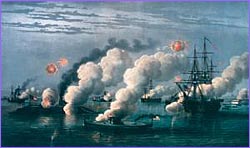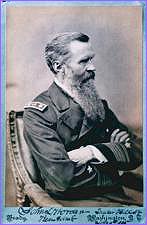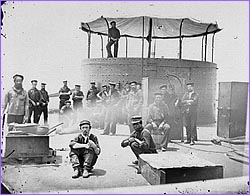
|

|
Part 3 | Back to Part 2 We were soon ready for her again as the order from Capt. W. indicated—"Port bow close aboard, load & fire as fast as possible." "A splendid shot, you raked them then." "Look out now they're going to run us down, give them both guns." This was the critical moment, one that I had feared from the beginning of the fight—if she could so easily pierce the heavy oak beams of the Cumberland she surely could go through the 1/2 inch iron plates of our lower hull. [The Virginia (A.K.A. the Merrimack) sported a subsurface, cast-iron ram for battering and piercing the hulls of enemy ships.] A moment of terrible suspense, a heavy jar nearly throwing us from our feet—a rapid glance to detect the expected gush of water—she had failed to reach us below the water & we were safe. [Unbeknownst to Keeler and the rest of the Monitor's crew, the Virginia's ram had broken off in the hull of the Cumberland the day before and had not been replaced.] The sounds of the conflict at this time were terrible. The rapid firing of our own guns amid the clouds of smoke, the howling of the Minnesota's shells, which was firing whole broadsides at a time just over our heads (two of her shot struck us), mingled with the crash of solid shot against our sides & the bursting of shells all around us. Two men had been sent down from the turret, who were knocked senseless by balls striking the outside of the turret while they happened to be in contact with the inside. At this time a heavy shell struck the pilot house—I was standing near, waiting an order, heard the report which was unusually heavy, a flash of light & a cloud of smoke filled the house. I noticed the Capt. stagger & put his hands to his eyes—I ran up to him & asked if he was hurt. "My eyes," says he, "I am blind." With the assistance of the Surgeon I got him down & called Lieut. [Samuel] Greene from the turret. A number of us collected around him, the blood was running from his face, which was blackened with the powder smoke.
The quartermaster at the wheel, as soon as Capt. W. was hurt, had turned from our antagonist & we were now some distance from her. We held a hurried consultation & "fight" was the unanimous voice of all. Lieut. Greene took Capt. W.'s position & our bow was again pointed for the Merrimac. As we neared her she seemed inclined to haul off & after a few more guns on each side, Mr. Greene gave the order to stop firing as she was out of range & hauling off. We did not pursue as we were anxious to relieve Capt. W. & have more done for him than could be done aboard. Our iron hatches were slid back & we sprang out on deck which was strewn with fragments of the fight. Our foe gave us a shell as a parting fire which shrieked just over our heads & exploded about 100 feet beyond us. In a few minutes we were surrounded by small steamers & boats from Newport News, the Fortress, the various men of war, all eager to learn the extent of our injuries & congratulate us on our victory. They told us of the intense anxiety with [which] the conflict was witnessed by thousands of spectators from the shipping & from the shore & their astonishment was no less on learning that though we were somewhat marked we were uninjured & ready to open the fight again. The Merrimac had a black flag flying during the fight. This was the Commodore's flag. She was crowded with men, accounts varied in number, some placing it as high as 400 & from that down to 200 [the Merrimack had 14 officers and 260 men]. The battle commenced at 1/2 past 8 A.M. & we fired the last gun at 10 minutes past 12 M [midday]. Capt. W. was taken off in a tug boat, in charge of an acquaintance to go to Washington. Our Stewards went immediately to work & at our usual dinner hour the meal was on the table, much to the astonishment of visitors who came expecting to see a list of killed & wounded & a disabled vessel, instead of which was a merry party around the table enjoying some good beef steak, green peas, &c.
"No Sir," says Lieut. Greene, "we haven't done much fighting, merely drilling the men at the guns a little." Never was a set of men more completely sold than those on board the Merrimac. She came out in the morning evidently expecting to find an easy prey in the Minnesota without any idea of finding a new antagonist. At first she would scarcely condescend to notice us till we gave her a taste of our quality from our 11 inch Dahlgrens, when she replied with grape & canister probably thinking that would demolish her puny looking foe. I believe I have already told you the compliments paid us by Gen. [John] Wool & Sec'y Fox—all regarded us as their deliverers nor doubt could the rebels have succeeded in their designs it would have been a disastrous thing for the country. They could have destroyed & driven off the shipping in the harbour, shelled out the Rip Raps [see map], & Fortress Munroe itself would have been at their mercy as Gen. Wool afterwards told us. The[y] would have attacked Gen. [Joseph] Mansfield's army at Newport News in front while [Confederate Major General John] Magruder took them in the rear. This & still more extensive plans of operations had been laid by them when our appearance blocked the game. The night after the fight I stood watch for one of the officers who I thought needed rest more than I did till 12 o'clock when I turned in & had the first sleep for three nights.
I think we get more credit for the mere fight than we deserve, any one could fight behind an impenetrable armour—many have fought as well behind wooden walls or behind none at all. The credit, if any is due, is in daring to undertake the trip & go into the fight, in an untried experiment & in our unprepared condition. We were all exhausted before the fight commenced, for want of food & rest—the men had never been drilled at the guns & were not prepared to act in concert—we were unacquainted with our own powers, offensive & defensive & knew nothing of our antagonist except the terrible exhibition of her destructive powers given the previous day. Before we left Brooklyn we heard every kind of derisive epithet applied to our vessel—she was called a "silly experiment," an "iron coffin for her crew" & we were styled fool hardy for daring to make the trip in her, & this too by naval men. But we did dare & we have won & what is more none of us were ordered to the vessel till we had expressed our willingness to go, or in other words we volunteered. We have had a letter from Capt. Worden's wife, she says that he is very weak & nervous, but the doctors say he will recover his sight though he may be confined for some time. . . . [see Afterword] [Marginalia] I fear this will scarcely be intelligible—it has been written while listening to discussions & conversations—sense & nonsense more distracting to me than the Merrimac's guns. If read to any out of the family you must apologise. I send lots of love & kisses to you all. Direct to Hampton Roads instead of Fortress Munroe. [No signature] Continue: Afterword Tour the Monitor | Behind the Scenes Eyewitness to the Battle | Steam Machine | Resources Transcript | Site Map | Lincoln's Secret Weapon Home Editor's Picks | Previous Sites | Join Us/E-mail | TV/Web Schedule | About NOVA Watch NOVAs online | Teachers | Site Map | Shop | Search | To Print PBS Online | NOVA Online | WGBH © | Updated May 2003 |



